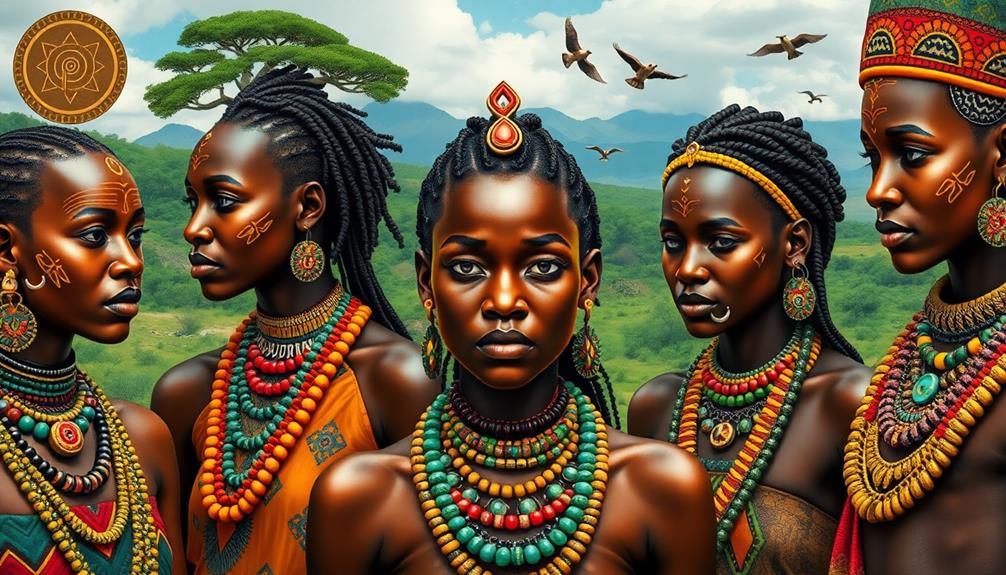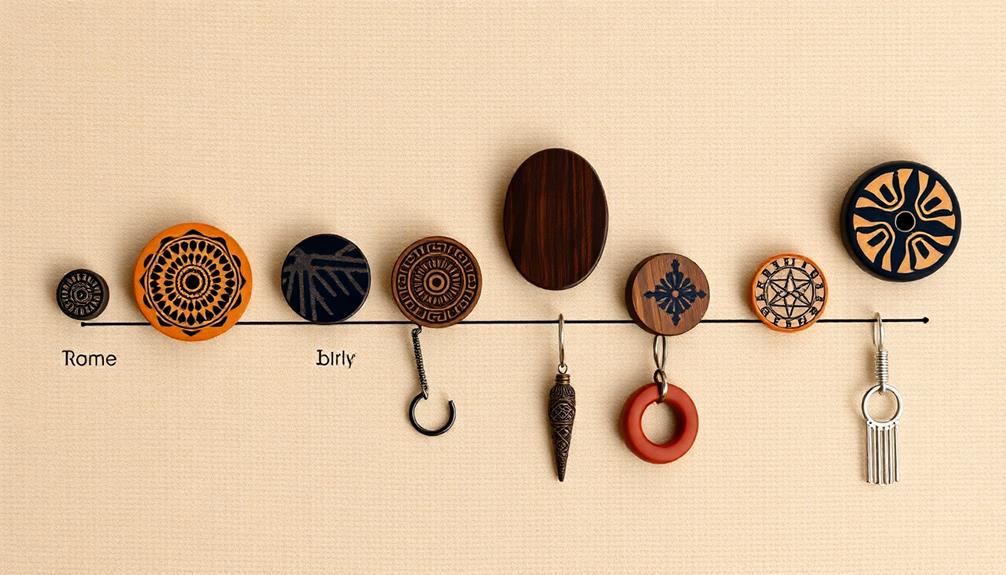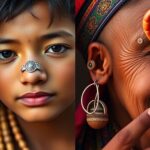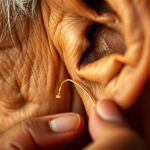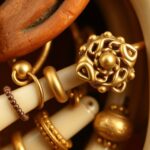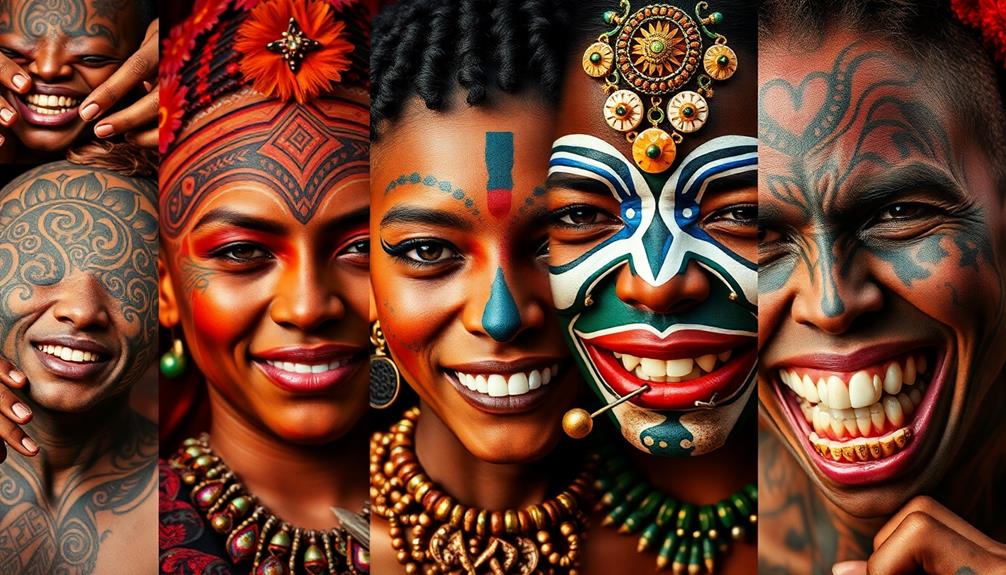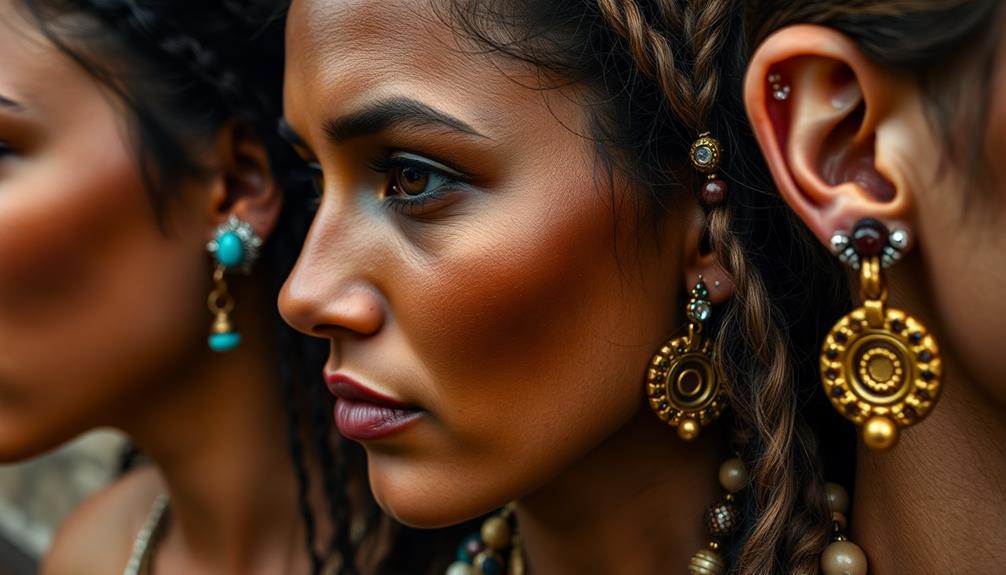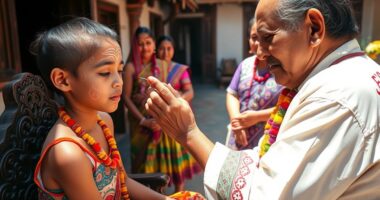In African tribal cultures, piercings carry deep meanings and practices that connect you to your ancestors and spirituality. They often signal rites of passage, marking key life changes. For instance, Maasai ear piercings denote maturity and social status, while Wodaabe lip piercings indicate readiness for marriage. Nose piercings symbolize beauty and marital status, showcasing wealth and identity. Each piercing style differs based on cultural lineage and reflects personal beliefs. As globalization intertwines with tradition, modern influences reshape these practices. If you're curious about how these traditions adapt over time, there's much more to explore.
Key Takeaways
- Piercings in African tribal cultures symbolize social status, identity, and cultural heritage, often marking important rites of passage.
- Nose piercings are sacred portals that signify beauty, femininity, and marital readiness within various tribes.
- Maasai ear piercings denote maturity and rank, while Mursi lip plates represent beauty and cultural identity during adolescence.
- Specific piercing designs and placements serve as unique identity markers and reflect tribal affiliation and cultural lineage.
- Modern influences, including globalization and social media, are reshaping traditional piercing practices while sparking debates on cultural preservation.
Spiritual Significance of Piercings
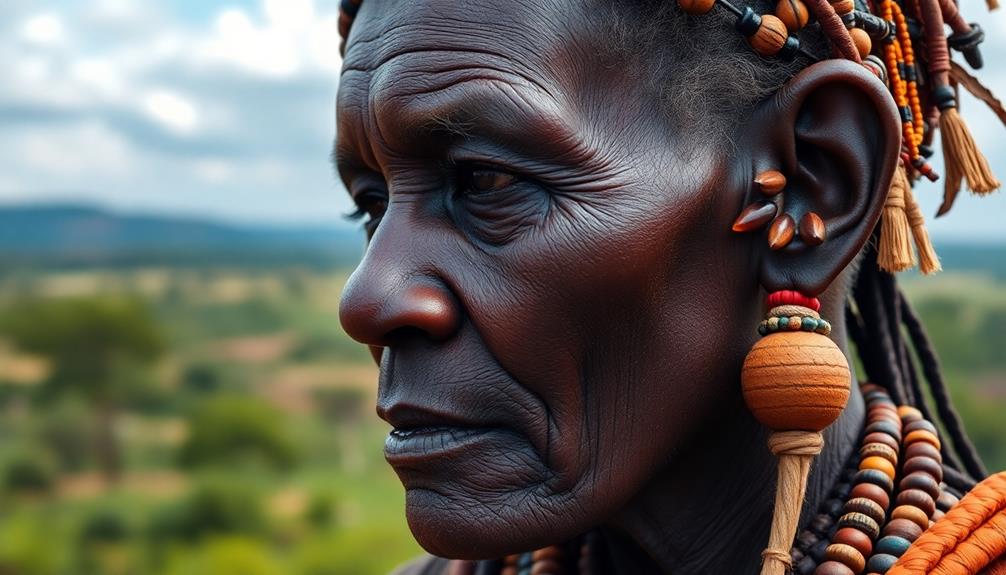
In many African tribal cultures, the spiritual significance of piercings isn't just about aesthetics; it's deeply rooted in beliefs and rituals that connect individuals to their ancestors and the divine. When you participate in these traditions, you're not merely enhancing your appearance; you're forging a direct link to ancestral spirits.
Nose piercings, in particular, are considered sacred portals that enhance communication with these spirits, offering guidance and blessings during significant life changes. The act of piercing often involves specific rituals that mark your readiness for new responsibilities within the community.
Each piercing carries meaning, reflecting your social status and tribal affiliation through styles and materials of jewelry. This visual representation of identity helps reinforce your place within the culture.
Moreover, many tribes associate piercings with fertility beliefs, viewing them as protective talismans that aid in conception and childbirth. By embracing these practices, you honor your heritage and acknowledge the spiritual connections that piercings embody.
Ultimately, these rituals reflect a profound understanding of life, identity, and the unseen forces that guide you throughout your journey.
Historical Context of Tribal Piercings
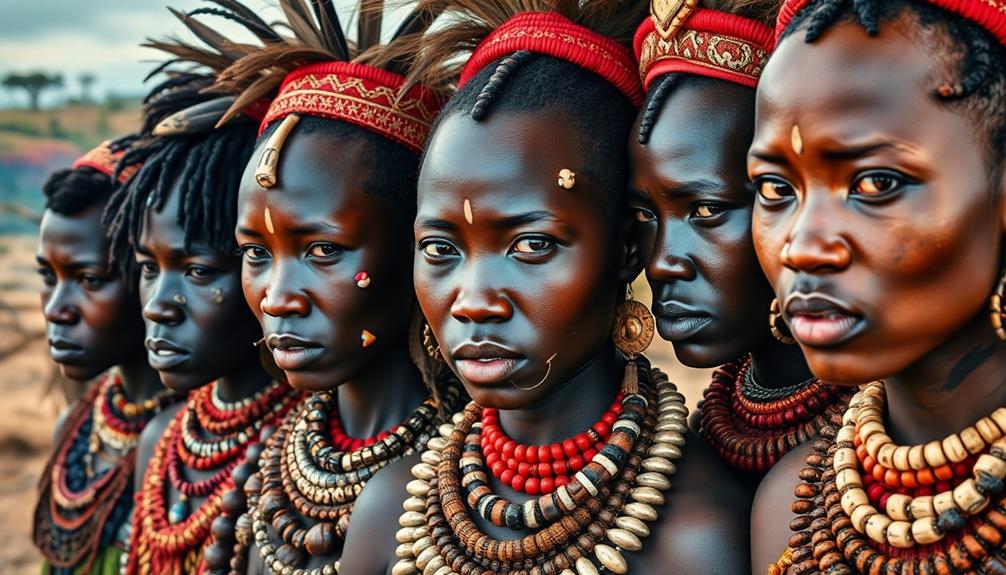
Piercings in African tribal cultures hold a rich historical context that reflects the evolution of identity and societal norms. For centuries, these body modifications have symbolized not just adornment but deep cultural heritage, connecting individuals to their ancestral roots.
You'll find that among the Maasai, ear piercings signify important coming-of-age rituals, with the size and number of piercings denoting maturity and social status within the community.
In the Mursi tribe of Ethiopia, distinctive lip plates serve as a striking representation of beauty and cultural identity, marking a significant change during adolescence.
Nose piercings also carry weight in many African cultures, often indicating marital status and tribal affiliation, with particular styles showcasing wealth and lineage.
Historical records reveal that body modification practices, including piercings, were integral to spiritual beliefs, allowing individuals to express their identity while honoring their ancestors.
This historical context of tribal piercings demonstrates how these practices have shaped social structures and personal identities across various African cultures, solidifying their importance in both past and present societies.
Cultural Practices and Symbolism
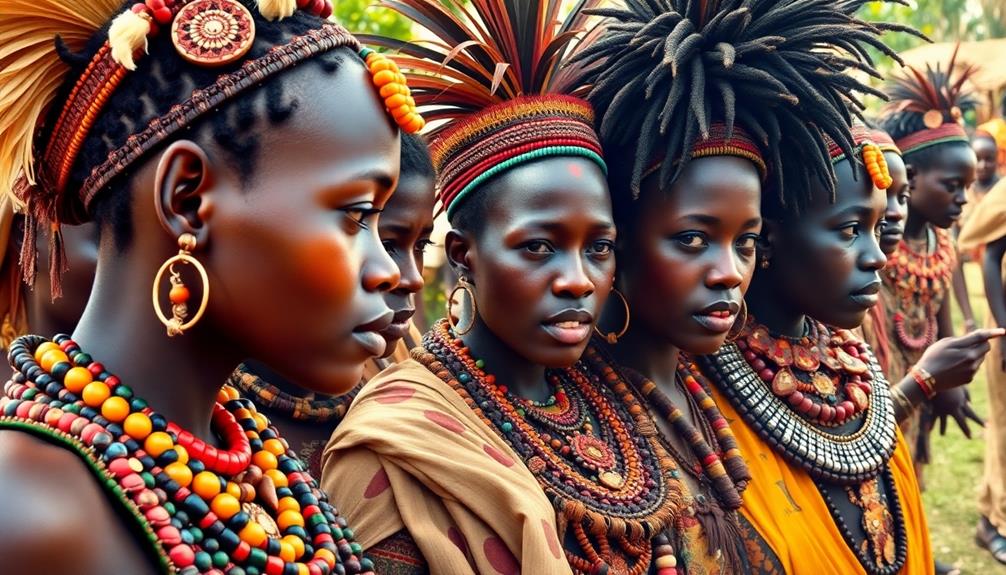
Body modifications like piercings play a significant role in cultural practices across African tribal societies, serving as essential markers of identity.
These adornments often hold deep symbolism and connect individuals to their community's heritage. Here are a few key aspects of this rich tradition:
- Tribal Affiliation: Piercings can indicate your tribe, linking you to a specific cultural lineage and community.
- Femininity and Beauty: Nose piercings, in particular, symbolize beauty and femininity, often reflecting marital status or readiness for marriage.
- Rites of Passage: Ear piercings represent maturity and are frequently integrated into rites of passage, marking your change from childhood to adulthood.
- Materials and Spiritual Significance: The materials used—like wood, bone, or metal—enhance cultural expression, while the piercing process often carries spiritual significance, connecting you to ancestors and traditions.
Through these practices, piercings become more than mere body modifications; they're a way to express your identity, honor femininity, and participate in the rich tapestry of African tribal cultures.
Embracing these customs can deepen your understanding of the spiritual and cultural significance tied to each piercing.
Rites of Passage and Social Status
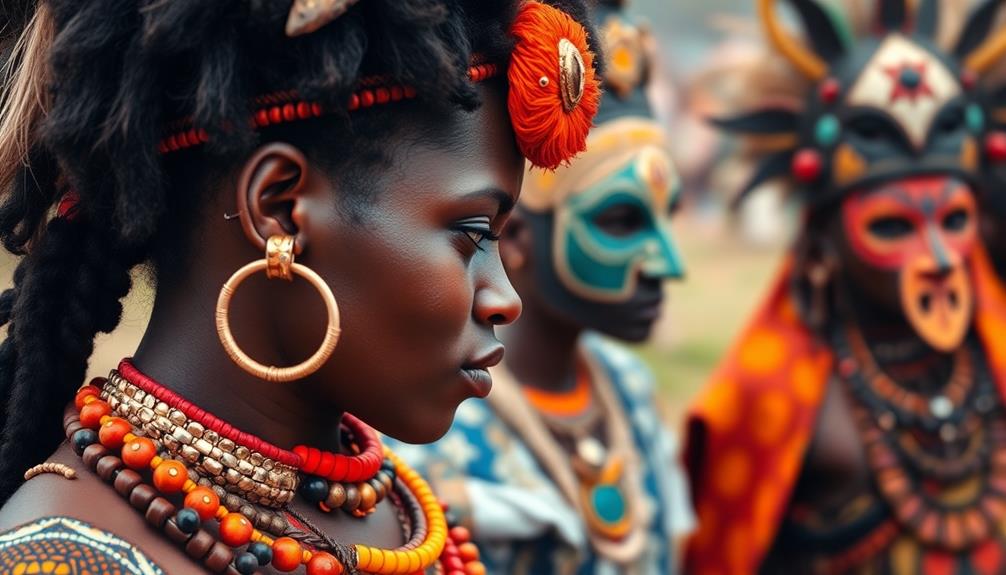
Rites of passage in African tribal cultures often hinge on piercings, marking crucial life changes and social standing within the community.
For instance, in the Maasai tribe, ear piercings serve as a coming-of-age ritual, signifying the shift to adulthood while also displaying social status. The size and number of earrings you wear can indicate your rank and wealth within the tribe.
Similarly, the Wodaabe people perform painful lip piercings to symbolize readiness for marital responsibilities, showcasing both beauty and strength during traditional ceremonies.
Nose piercings, too, play a significant role in social stratification, especially among women. They often signal marital status or the wealth of a husband, creating visual representations of one's social standing.
In various tribal cultures, these specific piercing designs and placements become unique markers of identity, reinforcing community belonging during rites of passage.
Modern Influences on Traditional Practices
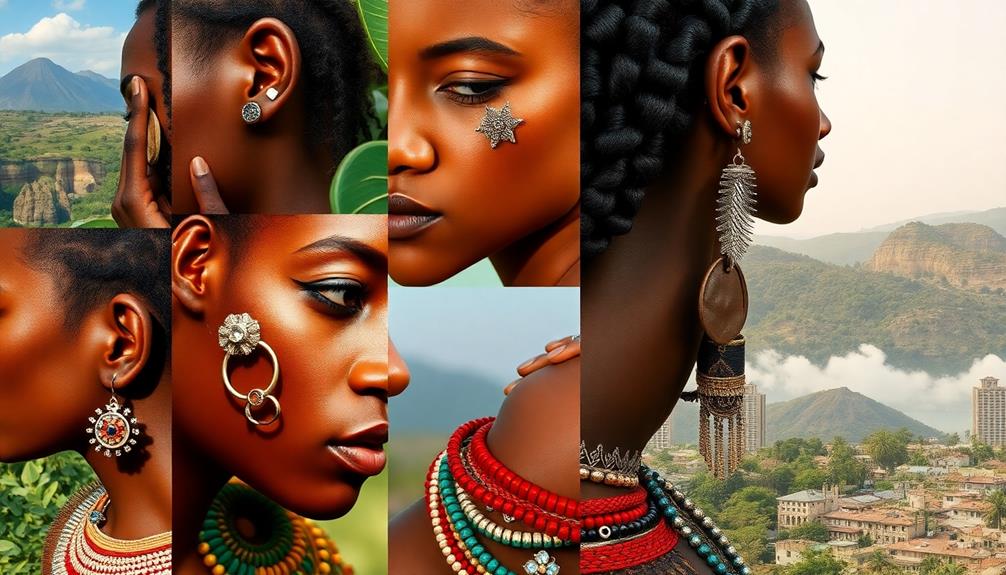
In recent years, globalization has greatly influenced traditional piercing practices among African tribal cultures. You might notice that modern influences are reshaping how these practices are perceived and performed. Here are some key aspects to reflect on:
- Youth Culture: Younger generations are often drawn to contemporary jewelry styles, blending them with traditional meanings.
- Social Media: Platforms allow for the sharing of diverse piercing customs, making various practices visible and trendy across different cultures.
- Hybridization: The incorporation of modern materials and designs can sometimes dilute the original cultural significance of piercings.
- Cultural Heritage: While some tribal communities embrace change, others resist, emphasizing the importance of preserving their unique piercing rituals.
This blending of traditional practices with contemporary influences reflects a broader trend where globalization impacts tribal cultures.
As you explore these evolving customs, it's vital to recognize how they navigate the tension between modernity and tradition. Maintaining cultural heritage while adapting to new trends is a delicate balance that many tribes face today.
Ultimately, these dynamics shape the future of piercing practices in African tribal cultures.
Frequently Asked Questions
What Do Piercings Mean in African Culture?
In African culture, piercings can signify beauty, maturity, and social standing. They're often linked to personal identity and community roles, reflecting your connection to heritage and the responsibilities you hold within your tribe.
What Is the Spiritual Meaning of Nose Piercing in Africa?
Nose piercings in Africa connect you spiritually to ancestral domains. They act as portals for communication with the divine, symbolize tribal identity, and serve as protective talismans, reflecting deep cultural and spiritual significance in your life.
What Is the Spiritual Significance of Piercings?
Piercings often signify personal transformation and connection to spiritual domains. They can enhance your identity, symbolize maturity, and provide a sense of protection, reflecting your journey and beliefs within various cultural contexts and traditions.
What Do Piercings Symbolize?
Did you know that nearly 75% of people with piercings say they feel more confident? Piercings symbolize identity, status, and personal expression, often marking important life changes while connecting you to cultural heritage and community belonging.
Conclusion
In understanding piercings within African tribal cultures, you uncover a vibrant tapestry of identity and tradition. These adornments aren't just decorations; they're stories etched into skin, each one whispering tales of heritage and belonging. As modern influences weave their way into these ancient practices, it's essential to honor and preserve the rich meanings behind them. By cherishing these rituals, you keep the pulse of culture alive, ensuring that the voices of the past continue to resonate in the present.

